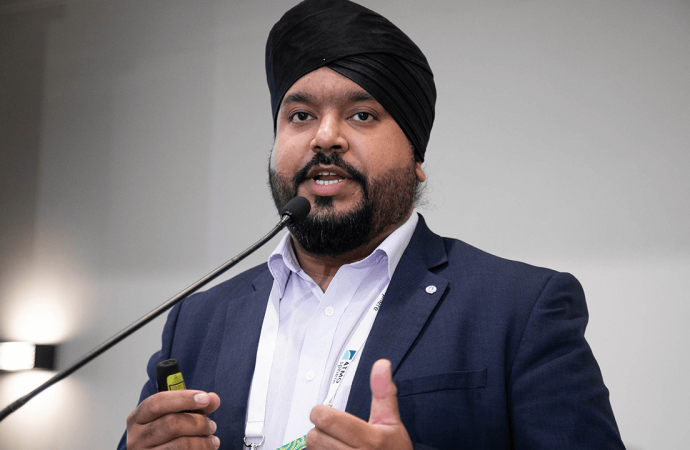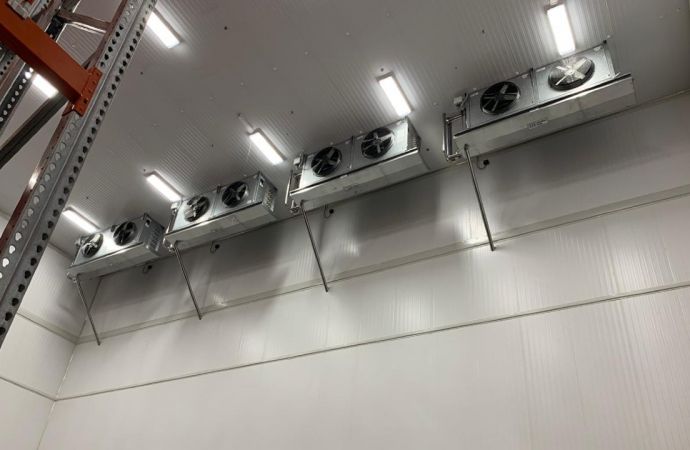Ammonia is the traditional refrigerant, while CO2 is a newcomer in the country’s cold-storage market.

Inderpal Saund, Beijer Ref Singapore Business Development Manager, Asia Pacific, presented some of the natural refrigerant opportunities available in the region at ATMOsphere Asia.
Industrial operators in the Philippines are more apt to select an ammonia/NH3 (R717) system than one using CO2 (R744), which is still new and unfamiliar in the market, said Inderpal Saund, Singapore Business Development Manager, Asia Pacific, for Swedish wholesaler Beijer Ref.
Saund made this observation at the 2020 ATMO Asia conference, held last November, as part of a Suppliers Panel discussing clean cooling opportunities in the Philippines.
“Ammonia is available and well known in the market and it’s easy to operate and maintain,” he said. “There is an abundant supply of talent and experience in handling the natural refrigerant. It is a good survivor in the region. Other technologies are still new and there is a fear of the unknown in using them.”
The Beijer Ref Group is a worldwide supplier of cooling technology and air conditioning equipment. Since 2015, Beijer Ref Singapore has had a close relationship with LBI Philippines, a cold-chain management solutions provider. LBI works directly or indirectly with Beijer Ref for the benefit of customers in the Philippines, offering turnkey solutions.
The two companies are working on an ammonia cold-storage project in the Philippines, awarded in 2019/2020. Saund described the project as a milestone for Beijer Ref and LBI. “This led to LBI securing more investment in building infrastructure and tooling, thus hiring more engineers and technicians to support operations,” he said.
The project saw the service providers supply the cold storage facility with an array of equipment, including 23 ammonia pumps and about 154 evaporators. “Beijer Ref played a key role in sourcing equipment and making sure that key components were presented at the table,” he said.
A CO2 (R744) system was considered, but due to the high ambient temperature in the region, among other factors, the refrigerant hasn’t been tested by the market. “Cost is the main concern and there might be a bit of fear about local knowledge and support surrounding the higher pressures of the refrigerant,” Saund explained.
As a result, end users in the Philippines choose ammonia, with its lower Initial cost and higher efficiency in warm climates. “The other aspect is that ammonia is well known in the industrial sector, said Saund. “When we speak about large refrigeration, or industrial type cold storage or processing, ammonia is still the preferred methodology when choosing a system.”
Trends in Southeast Asia
On the other hand, Southeast Asia and China have reported projects that feature transcritical systems, with some being the first in the market. Saund believes that the choice is driven by both the supplier and the end user. “The end user will say ‘I want the latest technology,’” he said. “As a supplier, we then present everything that is available as the latest technology –CO2, low charge ammonia, etc. Lastly, we present what is most suitable for the application.”
“But if you look at projects that we’ve done in the region with CO2 transcritical systems, they’ve mainly been driven by a thirst or hunger of the end user wanting the latest and greatest,” he added.
In the industrial refrigeration space, Saund said that some end users in Asian countries are willing to try new technologies with natural refrigerants. “There are little pockets of people trying it, but it is not as quick as the turnaround seen in Europe or the Americas,” he said.
Saund encouraged suppliers not to be shy in contacting Beijer Ref for assistance. “We are here as a support mechanism, feel free to contact me or the Beijer Ref team. We are willing to bring new technologies to you. We aren’t shy in educating anyone, so please take advantage of that,” he concluded.
Related stories



